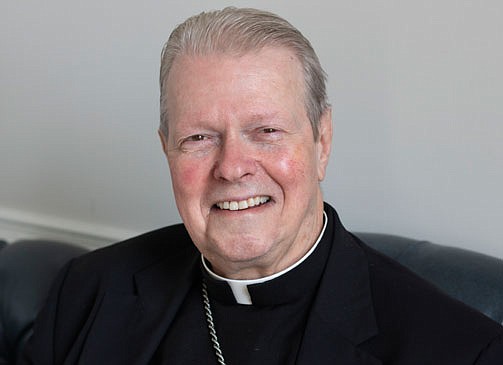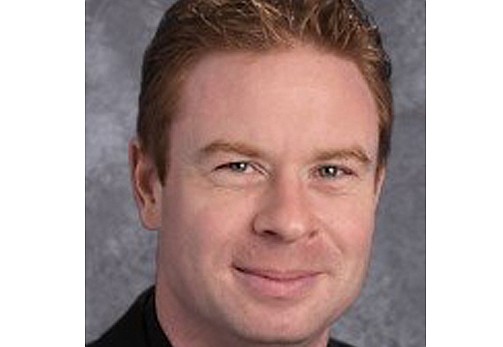January 25, 2024 at 7:00 a.m.
Islands of hope
“No man is an island,” poet and sometime philosopher John Donne proposed. As the cognate patently suggests, isolation may indeed become the fate of fabled island dwellers like Ariadne, Napoleon and Robinson Crusoe. Donne’s insight is that we thrive through our human relationships. “It is not good for the man to be alone” (Gen. 2:18), God said of Adam before creating Eve. As humans, we are diminished by the death or absence of even one person. All are — or can be — edified by the other’s very presence.
Presence takes many forms, as Christians know by faith and experience personally in many ways. The Triune God is as present to the tiniest nanoparticle as to the outer reaches of an ever-expanding universe: as vast as the cosmos, yet able and willing to occupy the throne of the human heart, to which God alone rightfully claims place. In every relationship, in the communion of faith, which is the Church, the Father is present in and with the Holy Spirit throughout the mystical body of the Word Incarnate, himself really present in the sacrament of the Holy Eucharist. No one indeed can be an island, united with a Creator God whose very nature is connectedness.
Islands need not be lonely places and even crowds may sometimes be. “Ah, look at all the lonely people,” John Lennon once lamented in a song of people passing one another by in an anonymous fog, like ships in the night. City denizens of northern climes often head south, seeking refuge from the cold and damp to winter on some tropical atoll, advertised luringly as some treasure, pleasure or fantasy island.
With great joy, I read the news of the light that shines from an island closer to home, a short causeway from the continental coast right off Mystic, Conn. Enders Island hosts the mission of St. Edmund’s Retreat, for decades a beacon of hope and healing to thousands of persons wounded in life’s battles, many barely of college age. Some have been imprisoned by various addictions. This island’s mission is to free them through the power of God’s loving grace to live their lives, the callings to which God alone can be their foundation and future. Father Thomas Hoar, SSE, has been at the heart of this inspired ministry, hardly an island unto himself as an article in this week’s The Westerly Sun profiles.
Father Tom, many readers may know, has also spent months with us in Albany as well, juggling several tasks, shuttling back and forth from Enders Island, as our Director for Vocations and Clergy Formation, a mission to which Father Anthony Ligato, presently a Vice-Rector at the Pontifical North American College in Rome, had been dedicated for over a decade, while himself pastoring several parishes. Father Tom will no longer be island-hopping, returning full time to his mission at St. Edmund’s Retreat.
Recognizing that promoting vocations throughout our Diocese and caring for the wellness of those who serve us as in their priestly, religious and diaconal ministries is one that all God’s people share in some way, we are now broadly expanding our leadership team and, in months ahead, will include many more of our vibrant and youthful people of faith. We are grateful to Father Tom for expanding our horizons of priestly formation. His pilotage has helped us discover other islands of grace where we may safely and confidently send our men to receive the best theological and propaedeutic training as they seek to grow, responding to the calling to which Jesus alone is their prime goal, as I have reflected upon in recent columns. Father Tom will continue to serve as a consultant to me on seminaries, as we now move forward to expand our team, headed by some of our younger clergy.
Among our many “islands of hope” for those discerning their calling, none are more fundamental than our families which provide the prime model and catalysts for promoting vocations. I want to invite the entire Catholic community to support our families in every way possible to nurture and nourish vocations to the priesthood, diaconate and religious life. Toward this end, in consultation with our Episcopal Vicars, Presbyteral Council and Clergy Formation Advisory Board, we are forming throughout every region of our Diocese parish-based teams dedicated in prayer and action. They will be trained and commissioned to support and accompany men and women whom God calls to serve as priests, deacons and religious, to foster spirituality and the sacramental life, enriching the Church and the world.
Our Vocations Ministry Office will soon announce new initiatives to reach out to our schools, colleges and university campuses and to offer support for families, and parishes as families of families, involving everyone in this common mission of the baptized. Indeed no one of us is an island but together we are commissioned to form islands of hope where our young people can find direction and support as they seek to discern how God is calling them, each by name, to find their place in our communion of faith.
I have no doubt that God is summoning enough men and women to leadership from our own Diocese, to meet whatever our Church and our larger communities need in order to discover and be sustained by the light of Jesus Christ, who came to be everyone’s Savior. By calling the apostles and their successors, as we heard as recently as last Sunday’s Gospel, Jesus desired to continue his mission on earth through his presence in the Church, the “ecclesia” or assembly of faith. When one begins to sense this call from God, they want to be sure it is the Lord who is calling them, which is the prime purpose of the road we call formation. This process extends throughout many steps, from inquiry and aspirancy, through the propaedeutic process or pre-theology and the years of formal pastoral and theological training. Anyone who wishes to know more about this staged process is encouraged to go to the website of the United States Conference of Catholic Bishops (USCCB.org) and consult the many resources there, particularly the current “Program for Priestly Formation” (PPF6, for short).
Anyone seeking more information may also be in touch with our Vocations Ministry Office, or just call me personally and I would be happy to meet with you. Besides priests, sisters and deacons themselves, who are the best practical “resources” on the life of clergy and religious, you might also find a conversation with their parents and friends enlightening. I can only imagine the first reaction of many of them when their ears were greeted with an announcement like “I think I want to be a priest (or nun, or brother, or deacon).” Maybe it was shock, fear or confusion at first. Why would he or she want to do that? What are its risks and dangers, its hopes and promises?
Some communities around the world are quite affirmative of such vocational inquiries, parts of Asia and Africa in particular. I recently returned from a visit with five of our priesthood aspirants in Nigeria and am overwhelmed by the joy and zeal of these men and of the priests and laypersons accompanying them. It was once clergy and religious, mostly from Europe and the United States who went to countries often labeled “mission territory.” They traveled there to evangelize and develop vocations. Now those former “missions” are enriching us with their faith! The four marks of the Church are one, holy, catholic or universal and apostolic. It need not surprise us if the Lord sends us generous servants from abroad even as we do not restrain our efforts to cultivate homegrown vocations in our more secular culture that does not always affirm the choice of a young person’s vocation to serve in the clerical or religious life.
Above all, however, we need to pray for those discerning the call and encourage them not to be afraid to ask seriously if God is calling them. “Unless the Lord builds the house, in vain to the builders labor” (Ps. 127:1). Men and women who follow the call come to learn that it is not about them, their career or design, but about Jesus who is calling them. It is not their particular talents or skills that count so much, but just knowing that the call is from God, like Matthew the tax collector learning one day to his astonishment. St. Thérèse de Lisieux recognized that the call was not given to her due to her own worthiness, but because of God’s desire. The old finger-pointing poster of Uncle Sam — “I WANT YOU!” — may best depict the seriousness and singularity of this call. If God is calling you, you had better listen!
@AlbanyDiocese
MORE NEWS STORIES
- Gaza parish attack, Marian devotion & vocations, St. Thomas More exhumation | Week in Review
- Catholic “American Ninja Warrior” fighting world hunger, one obstacle at a time
- Washington Roundup: Trump’s Epstein fallout; Congress backs rescissions; IRS church policy shifts
- Amid tragic deaths, Opus Dei men recalled as prayerful, inspiring sons of God
- Bishop places restrictions on Catholic influencer accused of misconduct, pending investigation
- Court blocks WA mandatory reporter law over lack of confession protections
- World leaders ‘appalled’ by Gaza church attack, amid calls between Vatican, Tel Aviv and Washington
- Houses destroyed, church burnt: new wave of violence against Syrian Christians
- Israeli PM calls pope, who urged the leader to start negotiations, ceasefire
- Patriarchs’ message on Gaza visit: Gaza’s community will not be abandoned or forgotten











Comments:
You must login to comment.